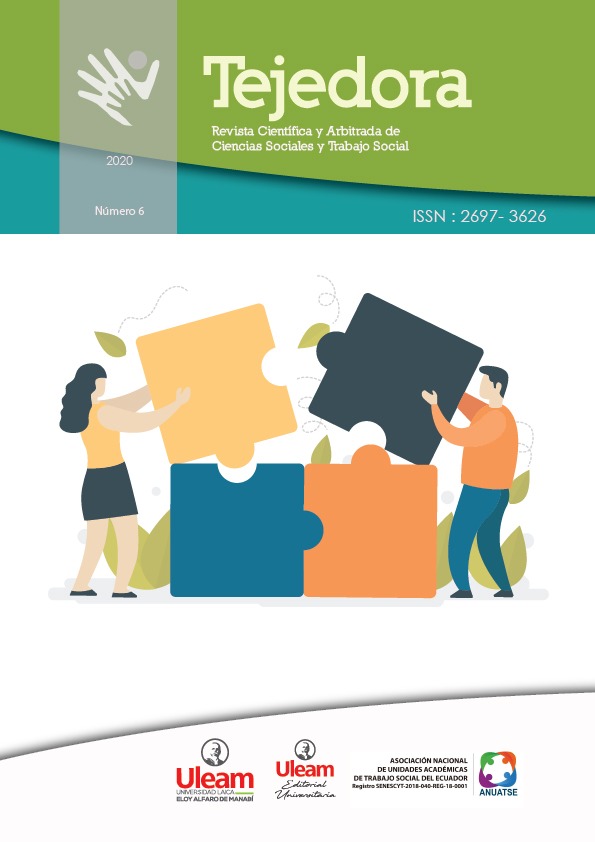Study of temporal-spatial perception in application of games
DOI:
https://doi.org/10.56124/tj.v6i12ep.0107Keywords:
Percepciones espaciales temporales, juegos, habilidades socialesAbstract
The objective of this study was to explore the acquisition of space-time perceptions through games in elementary school children from a school in Manta. It was a descriptive study with a non-experimental, field, cross-sectional design. Three instruments were designed, one for each sample. There was a sample of 14 teachers from the “Juan Montalvo” Educational Unit to whom a 22-item instrument divided into three sections was applied. There was also a sample of 136 education representatives who responded to a 20-item instrument and a sample of 104 boys and girls from the same educational unit who are in initial and basic elementary school. Almost all teachers include games in their strategy for teaching spatio-temporal perception. Playful activities are carried out at the beginning of the day and include activities that involve left-right, up-down, near-far and inside-outside notions of space. The representatives stated that boys and girls have mastery of spatial- temporal notions. They stated that they have a “lot” of mastery over these perceptions, exceeding 90% in all but the domain of left-right spatial perception. Regarding temporal perceptions, children kno173w how to differentiate day and night, but it is difficult for them to differentiate between before and after.
Downloads
References
Cañizares, J., & Carbonero, C. (2017). Cómo mejorar las capacidades perceptivo-motrices, la lateralidad... en tu hijo (Primera). Wanceulen Editorial.
Chamorro, I. L. (2010). El juego en la educación infantil y primaria. Autodidacta, 1(3), 19–37.
Davis, B., & Spatial Reasoning Study Group. (2015). Spatial reasoning in the early years: Principles, assertions, and speculations. Routledge.
Espinosa, F. J. G., García, A. R. R., & Rodríguez, A. N. (2018). Juego y actividad física como indicadores de calidad en Educación Infantil. Retos: Nuevas Tendencias En Educación Física, Deporte y Recreación, 34, 252–257.
Hernández-Sampieri, R., & Mendoza-Torres, C. (2018). Metodología de la investigación: las rutas cuantitativa, cualitativa y mixta (Primera). McGraw Hill Education.
Hernández, R., Fernández, C., & Baptista, P. (2014). Metodología de la investigación (Sexta edic). McGraw Hill Education.
Jacovkis, J., & Clemente, A. T.-C. (2021). COVID-19 y escuela a distancia: viejas y nuevas desigualdades. Revista de Sociología de La Educación-RASE, 14(1), 85–102.
Jones, D. E., Greenberg, M., & Crowley, M. (2015). Early Social-Emotional Functioning and Public Health: The Relationship Between Kindergarten Social Competence and Future Wellness. American Journal of Public Health, 105(11), 2283–2290. https://doi.org/10.2105/AJPH.2015.302630
Kurniawati, A., & Suparno, S. (2019). Learning Program to Develop Social Abilities of Children Aged 5-6 Years. Proceedings of the International Conference on Special and Inclusive Education (ICSIE 2018), 325–329. https://doi.org/https://doi.org/10.2991/icsie-18.2019.59
Moreno, J. L., & Molins, L. L. (2020). Educación y Covid-19: Colaboración de las familias y tareas escolares. Revista Internacional de Educación Para La Justicia Social, 9(3), 1–15.
Organización Mundial de la Salud. (2020). La OMS caracteriza a COVID-19 como una pandemia. https://www.paho.org/es/noticias/11-3-2020-oms-caracteriza-covid-19-como-pandemia
Quintana, J. G., & Jurado, E. P. (2019). Juego y gamificación: Innovación educativa en una sociedad en continuo cambio. Revista Ensayos Pedagógicos, 14(1 SE-Ensayos). https://doi.org/10.15359/rep.14-1.5
Sáez-López, J.-M., Sevillano-García-García, M. L., & Pascual-Sevillano, M. de los Á. (2019). Application of the ubiquitous game with augmented reality in Primary Education. Comunicar, 27(61), 71–82. https://doi.org/10.3916/C61-2019-06
Salazar, R. D. (2018). Programa de actividades lúdicas para desarrollar habilidades sociales. Hacedor-AIAPÆC, 2(1), 77–87.
Sánchez Casado, J. I., & Benítez Merino, J. M. (2014). Nociones espacio-temporales y bimodal: análisis de una implementación educativa para alumnado de 3 años. International Journal of Developmental and Educational Psychology, 3(1), 165–177. https://www.redalyc.org/articulo.oa?id=349851785017
Valecillos, B. (2019). Desde la pedagogía de la ternura: inicio de lo lógico-matemático en preescolar. Revista Scientific, 4(12), 220–239.
Vendrell Maños, M., Geis, À., Anglès-Virgili, N., & Dalmau Montalà, M. (2019). Percepción de los maestros sobre el derecho al juego libre en educación infantil y educación primaria. Estudio desarrollado en Barcelona (España). Bordón. Revista de Pedagogía, 2019, Vol. 71, Núm. 4.
Weissberg, R. P., Durlak, J. A., Domitrovich, C. E., & Gullotta, T. P. (2015). Social and emotional learning: Past, present, and future. In J. Durlak, C. Domitrovich, R. Weissberg, & T. Gullotta (Eds.), Handbook of social and emotional learning: Research and practice (pp. 3–19). The Guilford Press.
Published
How to Cite
Issue
Section
License
Copyright (c) 2024 Revista Científica y Arbitrada de Ciencias Sociales y Trabajo Social: Tejedora. ISSN: 2697-3626

This work is licensed under a Creative Commons Attribution-NonCommercial-ShareAlike 4.0 International License.






















